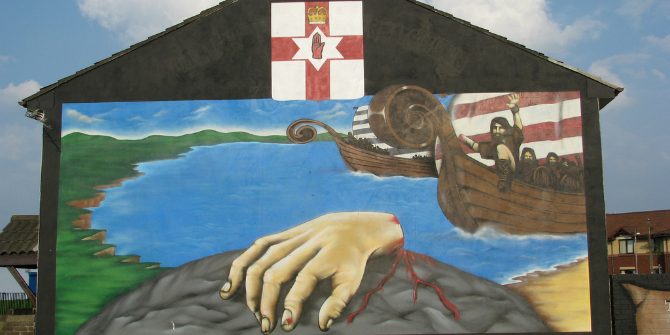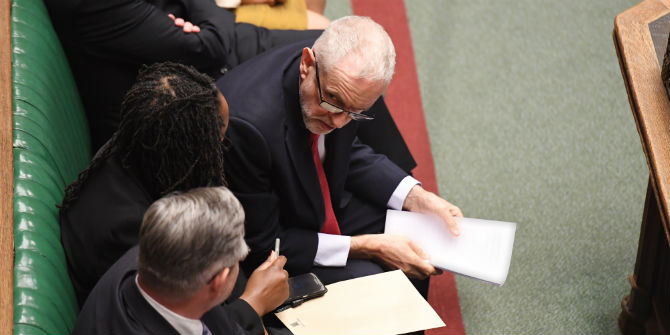

Legatum Institute’s ideas regarding the post-Brexit Irish border are highly problematic. Katy Hayward (Queen’s University Belfast) and Maurice Campbell (Queen’s University Belfast) write that these proposals are based on misperceptions of the border, Northern Ireland, as well as the fundamentals of European integration, international trade law and customs practice.
The paper from the Legatum Institute’s ‘Special Trade Commission’ on what it terms ‘the Irish border issue’ is to be welcomed for two reasons. The first is that the paper’s existence indicates this subject is of interest in London (and the well-publicised connections of the Legatum Institute means it is likely to have traction). In actual fact, parts of this paper (on ‘trusted traders’ for example) already appear to have had an airing in the UK Government Position Paper on Northern Ireland.
The second reason is that it gives those of us with a close and direct interest in this topic an opportunity to correct some of its most egregious misperceptions regarding the Irish border and Northern Ireland, and, indeed, of the fundamentals of European integration, international trade law and customs practice.
Opportunities and solutions?
Let us begin with the fundamental reason why the Irish border happens to be an ‘issue’ in the Brexit negotiations. The paper presents concerns about the border as being merely ones of commerce and logistics, with a hint of security risk thrown in. But no ‘solution’ to the border ‘issue’ has substantive credibility or viability if it is composed with such disregard for the rich and multi-layered cross-border relations that have flourished here as a result of the peace process and EU membership. Nor can such a solution be made more convincing by merely downplaying the challenges that it purports to meet.
As has been its take on most aspects of Brexit, the Legatum Institute wishes to present the Irish border as not only ‘a problem to be solved’, but ‘an opportunity’ (p.3). And what might this opportunity consist of?
“The opportunity that the people of Northern Ireland in particular have if the UK is more open to the world and engaged in trade liberalising initiatives with many countries, as well as global institutions like the World Trade Organization.” (p.3)
Ah-ha. And how might this happen, given the realities of Northern Ireland’s economy, the constraints on the capacity of its private sector, and the continued legacy of peripherality in economic development and policy-making? On that, the paper is silent.
It is also silent on the fact that all businesses trading across any customs border will have to find the resource to meet the very significant administrative burden of making electronic declarations for all goods imported and exported. This will have a chilling effect on growth of north/south trade, regardless of whether tariffs are imposed or not. Documentary evidence of proof of origin is another potential new and costly burden. Even if special measures are introduced which help reduce customs burdens at the time and place of import it is highly likely that additional record keeping would be needed to support the maintenance of extended auditable business records.
Without bothering to respond to these specific difficulties, the Legatum Institute returns to its mantra:
“There are so many potential solutions here that it makes no sense to put at risk the considerable trade opportunities that are possible for the UK simply because of misplaced fears about what constitutes customs clearance, and the supposed difficulty of customs administration. We can learn from the experiences of other borders, such as the US-Canada border…” (p.16)
Unfortunately, it is not the case that if you use the words ‘solution’ and ‘opportunity’ with enough conviction you can conjure them into existence. As we have explained elsewhere, customs administration is difficult – especially in the absence of adequate preparation, capacity for data exchange (ref: the current problems in the development of the customs declaration system due to replace CHIEF), and the paucity of highly experienced customs officers. We have also shown that, while the US-Canada border experience does demonstrate increased efficiency in processing customs clearance through the use of technology, it also shows that successful cross-border trade thrives on regulatory harmonisation and the movement of people to accompany the movement of goods – two points that the UK government seems determined to block post-Brexit.
 Image by Stuart Caie, (Flickr), licenced under Attribution 2.0 Generic (CC BY 2.0)
Image by Stuart Caie, (Flickr), licenced under Attribution 2.0 Generic (CC BY 2.0)
Ireland: from EU partner to negotiation hostage
Ah well, never mind north/south cooperation, Legatum would suggest, British-Irish trade is far more important for Ireland. In this vein, the use of tables of figures (pp.12-13) on trade between north and south and Britain and Ireland appears to be solely to disparage the significance of north/south trade. The point, however, is not that the volume of sales from north to south is comparatively low compared to east/west, but rather that 21% of exports from Northern Ireland go to the Republic, that the vast majority SMEs who export do so across the border, and that supply chains in the most regulatory-sensitive sectors criss-cross the border.
its cynical representation of Ireland as ‘reliant’ on the UK is as misjudged as it is misleading
To emphasise the importance of north/south is not to downplay the significance of east/west cooperation or trade. For peace as with future trading arrangements, good British-Irish relations are absolutely vital for any workable solution. In light of this, the Legatum Institute’s cynical representation of Ireland as ‘reliant’ on the UK is as misjudged as it is misleading.
Indeed, Margaret Thatcher would be shocked to see that even the modest progress in Anglo-Irish relations made under her watch has been thrown to the wind in Legatum’s vision of Ireland as a little more than a compliant lapdog. Take this as a ‘solution’ for agricultural trade across the Irish border:
“NI farmers also need to ensure that they have access to ROI markets and so it will be important to ensure that the ROI does not have regulatory barriers to NI agricultural exports.” (p.14)
The reality of the challenge, however, is not to persuade Ireland to lift all barriers to agricultural goods from the north, but rather to ensure that such goods from Northern Ireland would comply with European Single Market regulations for agricultural produce.
Similarly misleading is the claim that the ‘UK can use the WTO Agreement on Sanitary and Phyto-sanitary measures (SPS Agreement) to put pressure on the EU to agree suitable mutual recognition provisions on the date of Brexit’ (p.14) – even going so far as to suggest that it can take legal action to ensure it can continue to export to member-states.
But if the UK were to do a deal with another third country that would allow the free import of agricultural produce (that yummy prospect of chlorinated chicken), the EU has an absolute right to impose barriers to agricultural goods from the UK in order to effectively maintain food safety standards. Any legal case from the UK against this would not get beyond the initial phone call to the lawyers.
For the Special Trade Commission to get this so wrong either implies wilful ignorance (or misrepresentation) of the laws and norms of EU membership and international trade, or else complete indulgence in delusional old-school British nationalism.
Anglocentric British nationalism is embodied in its description of the Irish border
Some such nationalism – or at least an Anglocentric version of the same – is embodied in its description of the Irish border as one between ‘two nations’ (‘creating a prototype for ensuring a smooth, low friction border between nations’, p.5). This is not merely to contravene the niceties of diplomatic language; it is to fundamentally contravene the spirit and law of the 1998 Good Friday (Belfast) Agreement. That the Irish government retracted its claim over the territory of Northern Ireland was not to suddenly mean that Northern Ireland became a fully integrated part of the British nation. Instead, equal respect is to be shown by both states for the rights, identities and political aspirations of British and Irish, unionist and nationalist in Northern Ireland.
As a motivational tract for Brexiteers – ‘out of challenge comes opportunity’ (p.5) – this paper may have some value. But as a proposal regarding one of the most sensitive and complex problems to be generated by Brexit, it is politically crass, scientifically meritless and revives a neocolonialist tenor that has no place in post-Agreement British-Irish relations.
This post represents the views of the author and not those of the Brexit blog, nor the LSE.
Dr Katy Hayward is Reader in Sociology & Senior Research Fellow, Senator George J. Mitchell Institute for Global Peace, Security and Justice at Queen’s University Belfast.
Maurice Campbell is a Visiting Research Associate at the Senator George J. Mitchell Institute, Queen’s University Belfast.







The EU may very well have a right to stop non-compliant agricultural produce crossing into the Republic. But how would it go about doing so given how porous and sensitive the border is? I suggest the EU would be pretty powerless in this regard.
The reality of the challenge, surely, lies in what incentives the EU can offer to ensure that the UK follows or approximates Single Market regulation in relevant areas.
Of course given the porous border it would be impossible to prevent all non-compliant produce, so some smuggling might be inevitable. But large lorries or vans full of produce are quite noticeable.
From what I understand, there were border checkpoints for lorries until the single market was completed in the early 90s. It wouldn’t be perfect, but it wouldn’t be that difficult to enforce at a fairly basic level: lorries are permitted to use only a few major roads, where there are customs/other checkpoints.
I take your point, but the situation is surely very different to the early 90s. Firstly there is the prospect of wide differentials in tariffs, and secondly the complicating presence of the EU.
With respect to the first point, if WTO tariffs were imposed then I’d expect lots of white van men to develop side businesses ferrying produce on short trips across the border. As per your proposal they would not be checked.
With respect to the second point, if it were just a case of the UK and RoI facing the problem of potentially divergent product regulation then I’m certain we could invent some collaborative way to agree product regulations in order to remove the need for such checks at the border. The problem is the EU’s dogmatic attachment to ‘the integrity of the Single Market’.
I’m not sure what kind of argument “I assume you’ll be offering us nice things to abide by agreements we signed” was in your mind, but it’s not very convincing on the page.
Well it certainly seemed convincing to the EU when it offered Turkey nice things to enforce the EU’s other infamously porous border.
Anyway, abide by what agreements?! Article 50 states that the treaties cease to be in effect come the end of the two year notice period.
Thanks for this. Not only an enjoyable read but at last, an informed one regarding the seemingly intractable cultural, legal, economic and political problems raised in regard to borders by Brexit for the people living and working in Northern Ireland.
In a comments page on a piece on this issue recently in a national British newspaper the question as to whether the present British/DUP alliance government were guilty of breaking international law in their flagrant disregard to following the letter of the law in the Good Friday Agreement, itself an international treaty, arose.
No one had any immediate answers to this query.
If May’s coalition government are guilty of this wouldn’t this open the possibility of Brexit being challenged legally by nations farther afield than the EU 27, like the U.S.A, who surely also have a serious political interest in this Brexit Irish problem, with so many millions of American Irish citizens ?
Thank you. What an excellent analysis! At last a bit of truth.
Should Britain risk getting a reputation as a state that tries to use threats of instability to influence its neighbors? Russia has ended up a pariah by engaging in these kinds of stunts.
In a previous paper, ‘Brexit Blueprint’, Legatum state “The balance of trade and tariff rates under WTO rules is more damaging to the rest of the EU than to the UK, given the UK’s bias to services which are all tariff free, and given the devaluation of the pound which has already made the rest of the EU products less price competitive without extra tariffs.”
Is not the truth that until the EU decides to get flexible over the issue of the border there is no solution possible. It seems that the EU position of well you Brits broke it so you better fix it might be a good soundbite, it does not help find a solution.
Personally I can not see a solution. It may be that people in cars and busses will travel freely but the EU will insist that customs duties are paid and all food and livestock stops at a Border Inspection Post for clearance. Treaty change would be needed to be flexible and that is not going to happen.
Quite so – there is no possibility for the EU to be “flexible” in such a matter, it is delusional to expect a “transparent” border and HMG is still living in cloud cuckoo land.
The only good solution is to remain in the EU.
Ralph, I think the point is that there is no flexible solution that does not require Ireland & the EU to undermine the CU/SM except the UK staying in the CU or replicating it.
Ireland/the EU will not accept undermining the CU/SM. They – and the UK up until a year ago – recognise that the rules are necessary. They are the same rules that the UK endorsed for the Eastern borders of the EU/CM/SM.
Ireland and the EU are waiting for the UK to accept that if they want no significant border in NI, then they need to have either a unique situation where NI stays in the CU or the UK stays in the CU. Had TM not put herself at the mercy of the DUP by calling an election, this would still be a difficult problem to solve but now that she has, there’s little room for movement.
The fact is that the closest thing we’ve had to a practical suggestion regarding a frictionless border from the Tories involves Zepplins. That in itself speaks volumes. Steampunk Brexit anyone?
“Ireland and the EU are waiting for the UK to accept that if they want no significant border in NI, then they need to have either a unique situation where NI stays in the CU or the UK stays in the CU.”
And the UK is waiting for the EU to accept that there will be no infrastructure on the border irrespective of whether the UK as a whole, or just NI, are in a customs union with the EU.